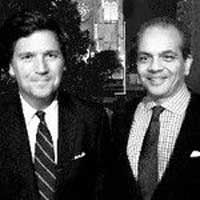Neil Patel is off this week, Veronique de Rugy is filling in his place.
President Donald Trump and President-elect Joe Biden are quite different from each other. It is obvious in their personalities and in their policy positions. So, we can reasonably assume that their White House management styles will also be radically different. One thing is for sure: No matter how the new administration is managed, there will be some internal conflict.
That's one of the many lessons I learned from Tevi Troy's 2020 book, "Fight House: Rivalries in the White House from Truman to Trump." The book was named one of the best political books of 2020 by The Wall Street Journal. Troy is a historian who has written many books about the presidency. This one is particularly entertaining, though, at times, disheartening. While many of us have shaken our heads in disapproval and dismay at the open chaos and infighting in Trump's White House, Troy reveals some of the other epic battles in the modern White House.
The reasons behind the fights are numerous. Some were the product of Cabinet members butting heads with White House staff. There were, for instance, the intense conflicts that occurred during the Kennedy presidency between then-Vice President Lyndon B. Johnson and the president's brother-slash-attorney general, Robert "Bobby" Kennedy. The two men hated each other and would sometimes end up not speaking. There were other noteworthy conflicts in the Kennedy White House.
Some administration fights have a lot to do with a president's temperament and tolerance for disagreement. Trump is renowned for enjoying the chaos. So, unsurprisingly, his staff and appointees have had little incentive to refrain from backstabbing their enemies, tattling and other shenanigans.
The Truman White House, as Troy explains, was a whole different story. He cites historian Alonzo Hamby's observation that while President Harry Truman's staff "was no freer than any other from ordinary tendencies toward turf battles, personality conflicts, and back-biting, such episodes were minimal." Unlike Trump, Truman loathed conflict. Instead, he valued close contact and oral briefings from anyone in his staff, which was guaranteed to scratch the ego of the traditionally higher-ranking individuals, such as Cabinet secretaries. But so it was.
Yet forbidding conflicts is no guarantee for peace. Troy's chapter on the Obama White House is called "Conflict in the Era of 'No Drama Obama.'" He writes, "There was no Baker versus Meese, no Kissinger versus Rogers, no Brzezinski versus Vance, let alone anything even close to LBJ versus RFK." President Barack Obama was committed to his White House being different, and that required setting some strict rules for those working in his White House. They include the imperative to be nice, a strict no-leak policy and extreme loyalty to one another. Yet, internal tensions still existed. And to my great surprise, many of the Obama dramas were about gender -- for example, female senior officials feeling dissed by their male counterparts. It created such drama that the senior female staffers even came up with a gender-specific name for themselves, "the Vagiants."
And then there was the Clinton White House, which seems to have been dysfunctional in every possible way. Staff fought with political appointees, and these appointees fought among themselves because of profound ideological divides. The whole thing was made worse by "a principal willing to tolerate disagreement, as well as a messy internal process." Interestingly, these internal tensions clearly quieted down during the second term, when Republicans impeached the president -- showing that external opposition can serve as a unifying factor.
As important as a president's policy positions and national leadership are, the presidency is about more than that. It's also about leading a team of ambitious, competitive, high-achieving personalities -- plenty of whom think they should be the one sitting in the Oval Office. It's the ultimate CEO job.
So, as President-elect Joe Biden prepares to make his home in the White House, I wish him -- and his staff -- good luck and recommend that they promptly read "Fight House" and learn its lessons. It will not be a waste of time.
--------------------
Veronique de Rugy is a senior research fellow at the Mercatus Center at George Mason University. To find out more about Veronique de Rugy and read features by other Creators Syndicate writers and cartoonists, visit the Creators Syndicate webpage at www.creators.com.
COPYRIGHT 2020 CREATORS.COM

















